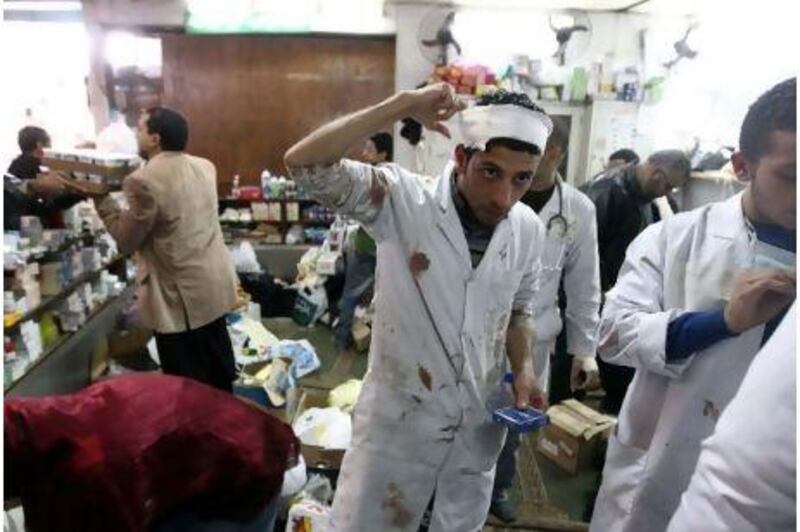CAIRO // In a dark alley behind Cairo's central square, a mosque has become a life-saving medical clinic.
Drips hang from the stained pillars, and the pulpit - usually reserved for the imam - is covered with plastic sacks full of bandages, syringes, pill boxes and other medical equipment.
"I have had to resuscitate people many times," said Saida, a volunteer nurse who gave only her first name. "We also had many fractures from people who had been beaten by sticks in the protest. We have very little equipment."
The mosque has been turned into a makeshift triage centre since the start of the popular protests in Tahrir Square against Hosni Mubarak, Egypt's president.
The clinic was overwhelmed on Wednesday after pro-Mubarak supporters surged into the square wielding machetes and bricks.
"They came in every two to three minutes, blood streaming down their shirts from severe head wounds from the rocks being thrown," said Dr Emani, who also declined to give her surname. Her voice was reduced to a whisper from the fatigue of treating people through the night.
_____________________
[ UNREST IN EGYPT: THE FULL STORY ]
_____________________
By Wednesday evening the injured, reclining on prayer rugs, spilled onto the street outside. "Between three and seven in the afternoon I received nearly 300 wounded," said Suzanne Ezmat, a clinic volunteer. "There were skull fractures, arms, legs broken.
"They plastered broken limbs here on the spot," she said, pointing to the dirt. "They used cardboard, and wood sticks to make splints.
"I am usually an Egyptology tour guide," she said. "But here I can be of use; I give injections, bandage and stitch open wounds."
The doctors reacted by expanding the clinic on to the square itself. On a pavement by the rioting crowd on Wednesday night, a chair and a pile of plastic bags containing medicines made up a new medical station. Doctors applied bandages, gave injections and diagnosed injuries, as metal bars, rocks and bullets flew overhead. Four doctors brought medical supplies from the mosque as others attended to the wounded.
Dr Mohammed Zanati, who heads the outdoor team, said: "We have two medical points outside. Wednesday we had five killed by sniper bullets. I saw one shot in the neck, and two in the head. The live fire came from over there," he said, pointing to the Hilton hotel, located on the side of the square on which the pro-government protestors assembled. "These have been the hardest days of my life."
Ibrahim Safi, 20, another volunteer at the clinic, said: "I dragged two of the dead bodies away from the crowd. You see the number of injured? Everyone!"
"The doctors made a real effort," said Aisha, a British Muslim resident in Cairo volunteering as a nurse.
The clinic is entirely ad hoc, coming from the efforts of citizens reacting to a need. The doctors volunteer throughout the night, after working in Cairo's hospitals during the day. "I am so tired I can't remember what day it is," said Dr Sharif Omar yesterday.
On Wednesday night he had been in Tahrir Square during the worst of the clashes. "If you have any way of sending ambulances - please, please," he shouted during a telephone interview. "I am on the street, there are hundreds down."
Dr Amr Bahaa, one of the organisers at the clinic, said the mosque was not designed to treat people with life-threatening injuries. Once they receive treatment they are then moved on to one of the city's hospitals.
"We went to the demonstrations searching for people with medical experience," Dr Bahaa said. "When internet and mobile phones were down on Friday we knocked on the doors of nearby houses for medical supplies."
"Friends donated, a pharmacy opened especially for us. We paid with our own money. Now the pharmacies have run out, and the volunteers are instead buying them from the nearby hospitals."
The relationship between the clinic and the surrounding government hospitals is beset with problems. There are reports that the hospitals have government orders not to co-operate with the clinic. "The government hospitals are not allowed to help us. But paramedics have been sneaking medical supplies to us," Dr Bahaa said.





